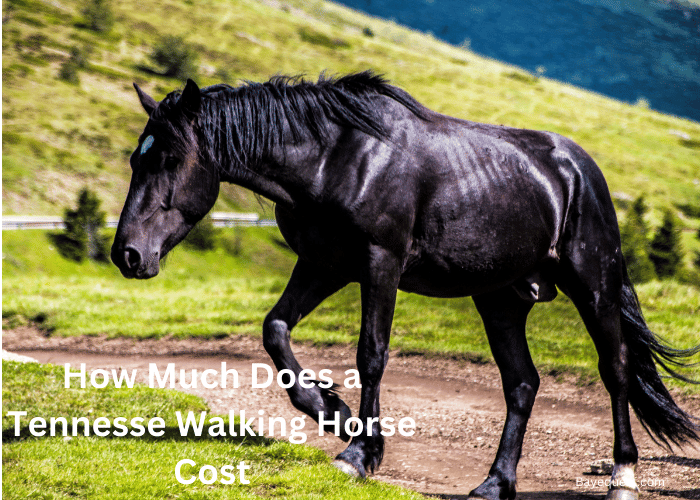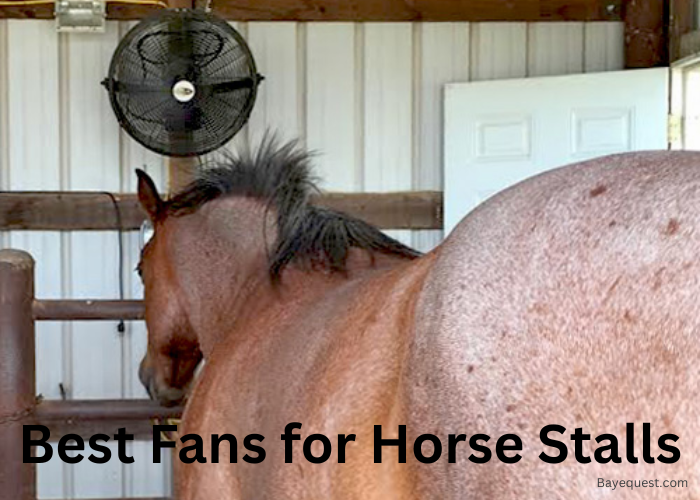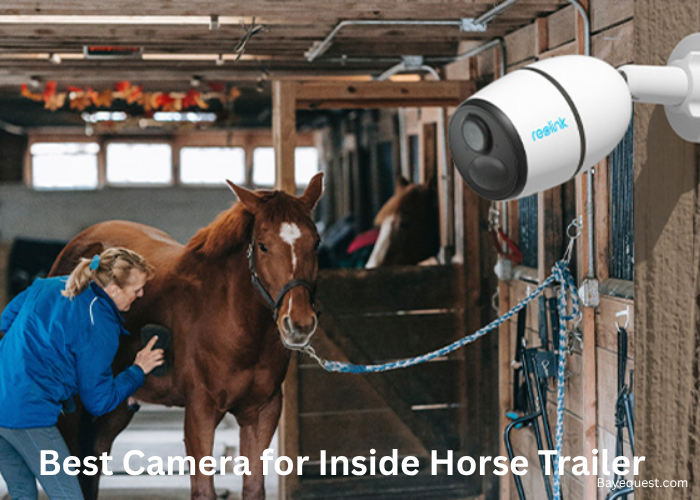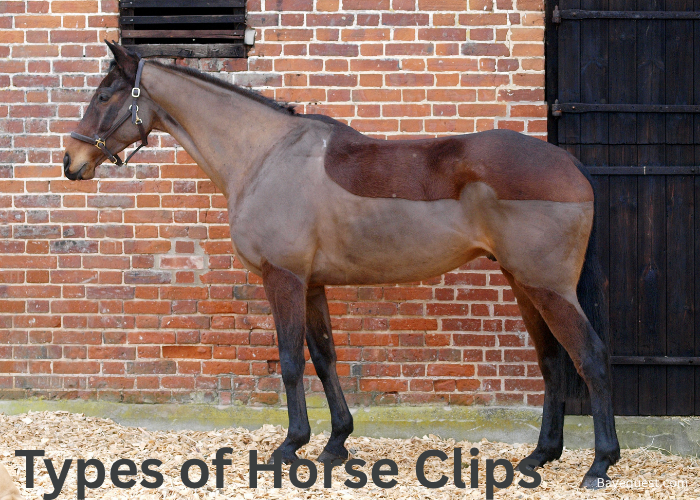Step into the world of Tennessee Walking Horses, the epitome of grace and performance. Often called the ‘Cadillac of trail horses,’ their unique four-beat running walk and smooth ambling gait are mesmerizing. These horses are not just about good looks; they boast an exceptional temperament, making them ideal for leisure rides, show rings, and even light farm duties.
But here’s the best part: owning this equine gem doesn’t mean emptying your wallet. While top-tier specimens may reach staggering prices, you can discover a hidden gem for under $5,000.
Dive into our guide to uncover where to find them, what factors to weigh in, and how to provide the best care for your Tennessee Walker.
How Much Does a Tennessee Walking Horse Cost? Key Takeaway
The average Tennessee walker price is $5,000. However, the actual price can be anywhere from $1,500 to $10,000. It depends on the equine’s age, gender, health condition, and the type and level of training. Always buy from a reputable seller and double-check the health and show records to avoid surprises.
Tennessee Walking Horse Origin and Characteristics
The Tennessee walking horse has been around since the 1800s. Needing a friendlier but more majestic horse to tend farms, breeders in the southern United States crossed the Hambletonian Trotter and a Morgan mare to produce the Walker race’s foundation sire, known as the Black Allan. Then they crossed Allan with Tennessee pacers to produce the modern Tennessee Walker.
It was the perfect horse for long-distance riders and soon found a home among traders, doctors, farm owners, and plantation workers. The owners even formed the Tennessee Walker Horse Breeders and Exhibitors Association of America (TWHBEA) to protect the new breed. The association registers 15,000+ new foals yearly and has 400,000+ walkers on record today.
The Tennessee walking horse (TWH) was named the official horse of the State of Tennessee in 2000. It’s also very popular in Kentucky, where it’s the third most common horse after the American thoroughbred and quarter horses.
An average walker features a finely chiseled head upon a long, refined, thin neck. Large eyes, short, erect ears, and tall legs give it an attentive posture.
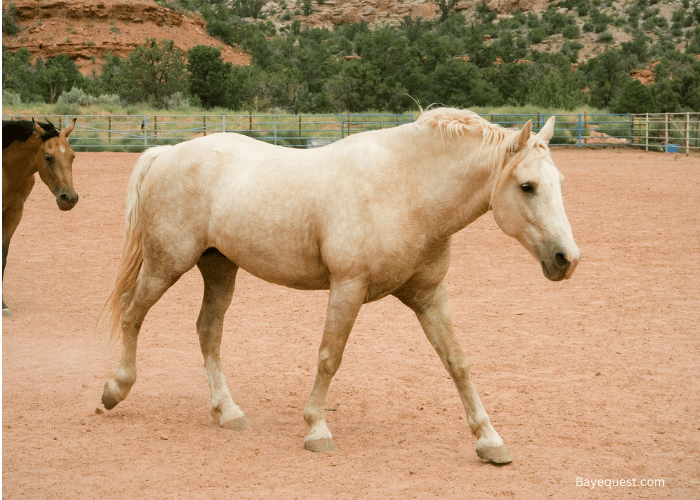
Why Buy a Tennessee Walker?
The four-beat gaited walker horse breed stands out from the outset. The following are a few reasons to consider if you plan to buy a horse in 2024.
- Physical attributes
The walker is a strong, powerful horse that grows to a towering 17 hands. Unfortunately, the largest ones are expensive. So, most breeders settle for walkers between 14.3 and 15 hands. They are athletic, muscular horses with deep chests and strong hindquarters. These qualities often characterize American hard workers such as the saddlebred and standardbred.
- Multiple color options
You can find Tennessee walkers in a wide range of colors. These include black, bay, palomino, chestnut, sorrel, and roan. Bay walkers are dark-brown with black legs, tails, and manes. Meanwhile, palomino walkers have rich golden bodies with white tails and manes. Buckskin and pinto patterns, such as the tobiano, are also available.
- Calm temperament
Tennessee walking horses are calm, gentle horses, perfect for pleasure riding. Their gentle temperament makes them excellent for kids, beginners, and general training. This is why the Tennessee walker horse (TWH) is ever-present in horse shows, from trail riding contests to saddle championships.
- The unique running walk
Horses with a natural gait are very comfortable to ride. So, they are great for older riders, rough terrains, and people with back pains. The Tennessee walker is the most comfortable of them all, thanks to the unique running walk.
The running walk is a special four-beat gait where each foot hits the ground independently, creating a “rocking chair” feeling. The smooth-gaited walker oversteps the front foot line by 6-18 inches while rhythmically nodding its head.
They can perform four other gaits, namely the rack, canter, pleasure walk, and flat walk. A few can even perform the famous trot. But some of the gaits aren’t allowed in the show ring.
How Much Does A Tennessee Walking Horse Cost in 2023?
Unfortunately, gaited horses are pricey. The average Tennessee walking horse costs $3,500 to $5,000 at local auctions. But a trained TWH can set you back $20,000+, while top show walkers cost $600,000+
Exact prices depend on age, gender, color, and the type and level of training. It also depends on your location and the equine’s health.
The youngest walkers are relatively affordable. For instance, you can find young foals for under $1,000 at equine auctions. But beware that, unlike other horses, you cannot buy a filly or colt walker. Fillies are female foals under four years, while a colt is a similar-aged male. Tennessee walkers cannot be separated from their families at a young age.
Foals up to five years cost $1,000 to $3,500, while mature stallions and mares cost $3,500 to $5,000, on average. Meanwhile, a gelding can cost slightly more because castration costs up to $300 in some states.
The color is critical as some patterns are highly sought after. For example, most farmers prefer dark bay horses with no marks. Therefore, a bidding war may ensue, driving up the prices. White horses with pink skins are also rare, thus precious. Generally, you should be prepared to pay a little more to get your favorite color.
Finally, highly-trained walkers primed for shows and competitions cost a premium. For instance, one breeder recently told ABC News that most of the TWHs he trains to compete in shows sell for $30,000 to $100,000.
Most sellers charge a commission, also known as a finding fee. It’s usually a small percentage of the asking price. Ask out it early, specifically the amount and who pays the cost (the seller or buyer).
Tennessee Walking Horse Ownership Costs
Besides the upfront (purchase) cost, you must be prepared for upkeep costs, particularly boarding, feeding, and healthcare bills.
Boarding costs depend on keeping the horse on site or registering them at a boarding facility. Most states ‘ facility boarding rates start at $500/month, with prices as high as $2,000/month in others. You should budget at least $6,000 yearly for this purpose.
Feeding costs are equally high as the horse needs a balanced diet with plenty of proteins, vitamins, and minerals. Moreover, it’s a big horse with a big appetite. The average walker consumes 2% of its body weight daily, translating to 18-24 pounds of hay. In addition, you need 2-5 pounds of commercial feed to keep your walker in optimal health. This often costs $2,000+ yearly.
Vet care costs vary, depending on the horse’s age and health. But it costs at least $1,000 annually. Routine wellness checks alone cost $300 to $600 and you need one annually. Add to that deworming, cleaning, and vaccination costs, and you easily arrive at $1,000+.
Finally, the supplies budget consumes up to $2,000 in the first year. However, you significantly cut the expenses by reusing blankets, saddle bags, toys, and first aid kits.
The Most Expensive Tennessee Walking Horses in History
We’ve seen a few truly special Tennessee walker horses in the south. But none comes close to NYPD from Virginia.
The rare stallion won his first award at barely three years old, scooping the Three-Year-Old Stallion Class of 2003 title at the Columbia Spring Jubilee. Then he went two years straight without losing, winning two world championships and two world grand championships in the process.
He then entered the Amateur category, where he won multiple titles, before returning to the open division in 2009. He won the North Carolina Open Championship that year.
NYPD retired in 2012 to become a breeding stallion, costing the new owners an eye-watering $1.6 million. He’s the most expensive Tennessee walker to date.
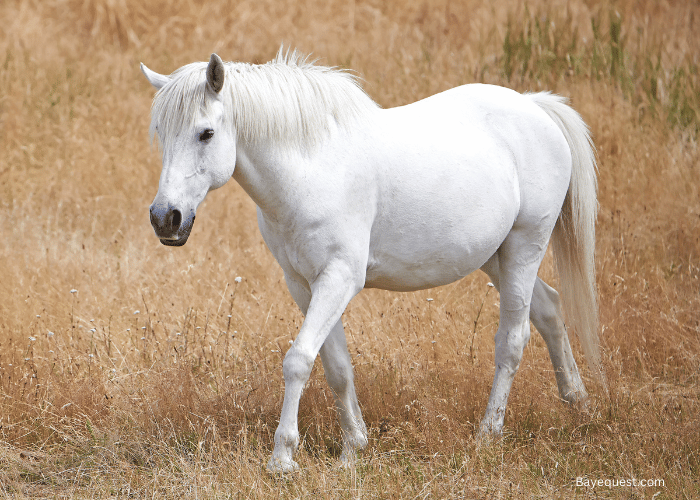
Best Places to Find Tennessee Walkers for Sale
Many owners are lucky to inherit horses from parents or other family members. Others also receive them as gifts. But that doesn’t mean you can’t find one on the open market. The following are three places to begin your search;
- Exhibitions
Exhibitions are the best places to shop for top-performing horses. Thankfully, a special Tennessee Walking Horse National Celebration (TWHNC) happens yearly in Shelbyville, Tennessee. The show attracts over 2,000 horses and over 250,000 visitors, including sellers and buyers. It’s an opportunity to sample the world’s finest walkers.
- Equine markets
If you cannot attend the TWHNC, online marketplaces are easily accessible. A quick online search reveals dozens. Browse around, ask questions via the support channels, and make an appointment to meet an equine owner or breeder. Google is the easiest to navigate. But social media is just as resourceful.
- Auctions
Breeders and owners looking to offload a few equines or an entire stock occasionally turn to auction markets. So, you can find gems here. But be warned that many horses go on auction for peculiar reasons. Therefore, it helps to bring along an experienced trainer. Also, consider a vet checkup before paying.
Read: How much does a Miniature Horse Cost?
Tennessee Walker Horse Buying Tips
A Tennessee walker can be a wonderful investment if you find the right one. Here are a few tips to help you avoid duds;
- Check the records and documents: The health and competition records reveal the horse’s general state. Your trainer and vet will help you scrutinize the documents to make the right decision.
- Consider a pre-purchase exam: After verifying the records, consider a pre-purchase exam by a American Association of Equine Practitioners member. The report will give you a hint on the horse’s future health.
- Warranties and guarantees: Nearly all horse sales involve warranties and guarantees. Make sure the documents capture your needs. For instance, some guarantees prohibit certain types of training to safeguard the horse’s well-being. Only sign on the dotted line if you’re happy with the terms.
- Trial periods: A trial period makes a lot of sense if you find a few sticking points when scrutinizing the records or analyzing the pre-purchase vet report. It also allows you to “test” the horse in its new environment before committing the full amount.
- Leasing vs. Buying: A few sellers, especially breeders, happily lease their stock to reputable customers. It’s a wonderful alternative, allowing you to own your favorite horse without a massive outlay.
FAQs
What is a Tennessee Walker Good for?
Tennessee walker horses are ideal for driving, riding, and light farm duties. Indeed, it was specially developed to provide smoother, safer rides for farm and plantation workers navigating rough terrains. The gentle, four-beat gait provides unmatched comfort. However, modern walkers are equally competitive in the show ring.
How Long Can a Tennessee Walker Horse Live?
The average Tennessee walker lives for 28 to 33 years. It depends on the horse’s health and fitness. Healthier horses sometimes live longer, while frequent illnesses and poor eating habits can shorten their lifespan. The oldest walkers live to 35+ years.
Is a Tennessee Walker a Good Beginner Horse?
Yes, Tennessee walkers are good beginner horses. They are very friendly horses with a calm temperament and regularly greet the owner at the fence, eager to go for a ride. Above all, the TWH is a gentle, intelligent horse that quickly learns the owner’s preferences.
What’s a Tennessee Walker Horse Used For?
The Tennessee walker horse is a versatile servant who thrives in multiple disciplines. They were originally developed for ordinary farm work, especially in southern plantations. However, they also excel at riding, driving, and racing. A few even win awards in the show ring.
What’s a Big Lick Tennessee Walking Horse?
“Big Lick” walkers are performance horses donning tall, heavy pads for accelerated gaits. The stack of pads creates an unbalanced posture, like wearing high heels. Alternatively, the trainer may apply a chemical, such as diesel or mustard oil, or trim the hooves to expose the sensitive part for enhanced gaits. It’s illegal in horse sport.
Final Trot: Summing Up the Cost of a Tennessee Walker
The naturally gaited Tennessee walker is a majestic horse popular for its smooth-as-silk running walk. It’s also a very friendly horse, perfect for beginners and kids. But it doesn’t come cheap.
The average walker costs $5,000, while highly trained geldings cost multiple times more. Fortunately, you can recoup the investment in a few years if you choose right.




